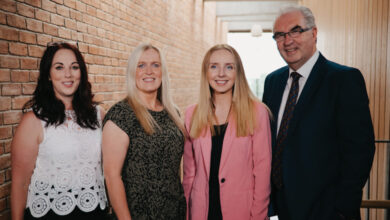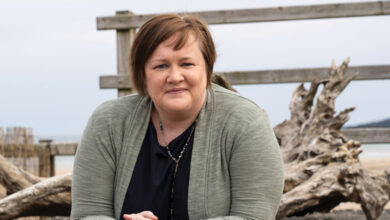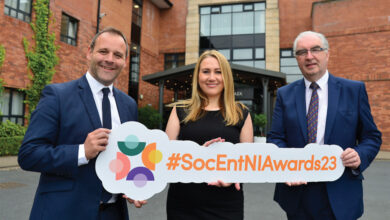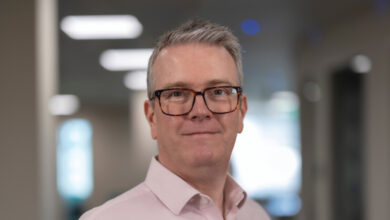Pivoting in pandemic
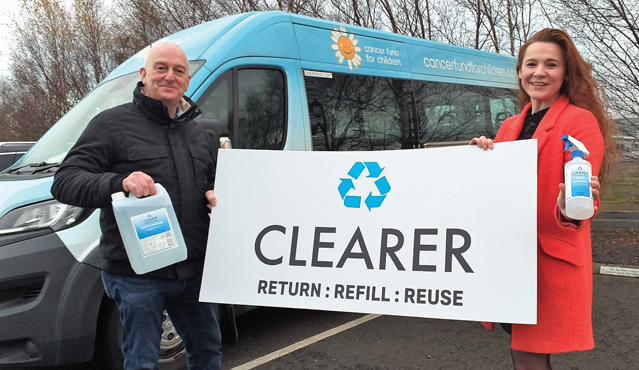
AEL’s Chief Executive David Hunter discusses pivoting in a pandemic and the need for social value to be a core plank of plans to build back better.
Formed as a social enterprise in 1998, Acceptable Enterprise Ltd (AEL) has built up an impressive portfolio of businesses and training programmes over the past eight years from its base in the Centre Point building in Larne.
The social enterprise creates employment opportunities for individuals traditionally excluded from the labour market, particularly young adults with learning difficulties, and the business model consists of a broad mix of enterprises ranging from the manufacturing of bottled water, online retailing, an on-site café, and horticultural and allotment services.
Until very recently, the social enterprise boasted an impressive acceleration, growing its number of employees from 13 in 2012 to over 50 in 2020 and possessing an annual turnover of over £1 million, almost 70 per cent of which came from commercial activity.
However, as it has for many businesses, the pandemic has utterly changed the business landscape in which AEL once operated and brought about requirements for innovative solutions.
Hunter, AEL’s Chief Executive and a Director on the board of Social Enterprise NI, describes the initial shock felt by the social enterprise.
“I was in Dublin about to present on the importance of social value in the RDS when the then Taoiseach announced the immediate closure of schools and public facilities from Washington,” he explains.
“The room immediately began to empty and the gravity of the situation we were facing was absorbed. We proactively took steps for our own organisation, moving prior to a similar announcement by the Executive in the following days, to reduce the footfall in our building with an outlook to keeping people safe and preventing the spread of Covid-19.”
AEL were forced to stop over 100 weekly training placements for disadvantaged adults and introduce measures to continue operating its social enterprise businesses. However, as Hunter explains, lockdown had a dramatic impact on many of these businesses.
For example, Clearer, AEL’s flagship social enterprise, which sources and bottled water, recognised a dramatic fall in orders, given that a large percentage of its customers were in the hospitality sector and were also under restrictions.
Candyrush, AEL’s social enterprise which packages goods imported from around the world and sells them online, was closed in April, although re-opened in May.
“When lockdown hit the businesses, our orders fell off the cliff and by the end of May I could barely look at our figures they were so bad,” explains Hunter.
AEL were forced to furlough many of their workers, retaining a skeleton staff to honour commitments to customers.
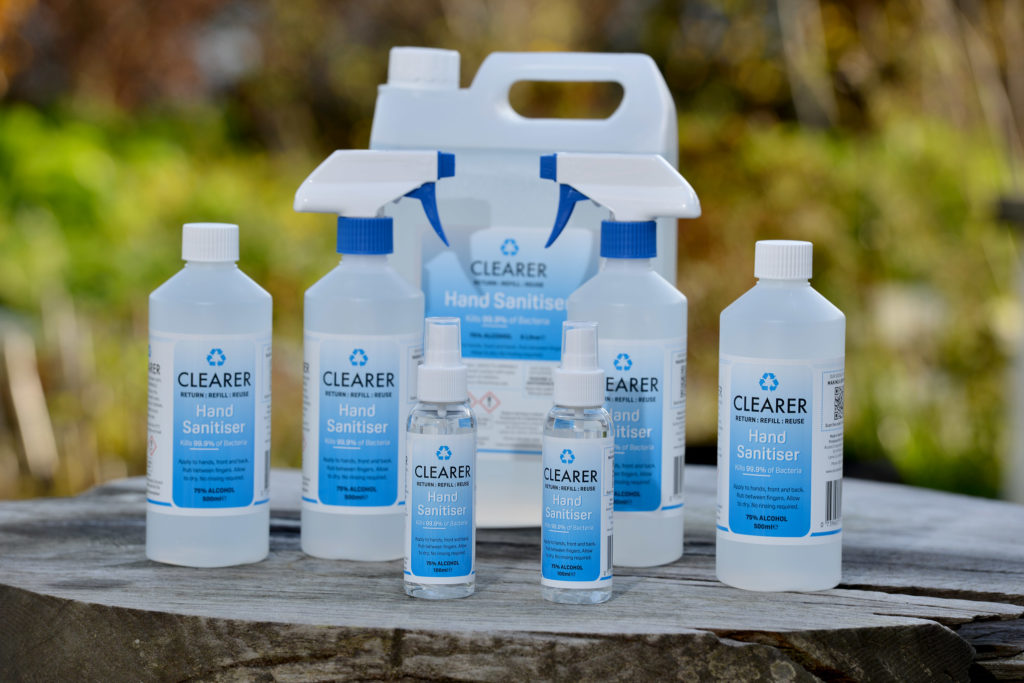
Hunter recounts a moment in May 2020, when he was sat in the normally bustling building in Larne, amidst complete silence, and “a feeling of helplessness and lack of control” over the eight years of hard work that had been put into building something wonderful.
At the same time Hunter had thrown himself into his work as a director on the board of Social Enterprise NI, lobbying for the sector and the supports necessary to maintain a sector that creates jobs and brings added value to the local economy. To this end, Social Enterprise NI were successful in securing government support for the sector by way of a grant scheme.
Hunter explains that while the news was welcome, there was an understanding that using the support simply to pay running costs of the business were not getting to the root of the problem.
“For AEL this meant that we had to put our heads together and what we came up with was a simplistic plan to strengthen those parts of our business least impacted by Covid-19 and diversify those areas heavily affected,” he says.
As a social enterprise, all of AEL’s profits go back into the business and the money is used to change people’s lives in terms of employment and training programmes.
After an initial closure, AEL’s Candyrush enterprise re-opened in May 2020. By summer, the business was trading at the same level it had the previous year, taking advantage of increased online trading. However, as Hunter explains, as well as introducing measures to ensure staff’s safety, re-opening the business also meant new business models, managing a disrupted supply chain.
AEL’s major innovation has come in the form of Clearer, as Hunter explains: “With very little business being done, what we had was an asset of a water bottling plant. It took us to strip that back and think, actually what we have is a bottling plant, how can we use that?”
AEL explored options for using the plant to package and supply hand sanitiser, however, at the time, it was a swamped market, with other businesses, such as breweries, similarly diversifying their production lines and the cost of sourcing hand sanitiser was at a premium.
“We waited and we watched and most importantly we did this with a focus on how we could generate social value,” explains Hunter.
What AEL did was apply a focus which they had been invested in for their Clearer business, in terms of the environmental impact of packaging. Pre-Covid, Clearer had diversified into glass bottle production and boasts a proud environmental focus in their product.
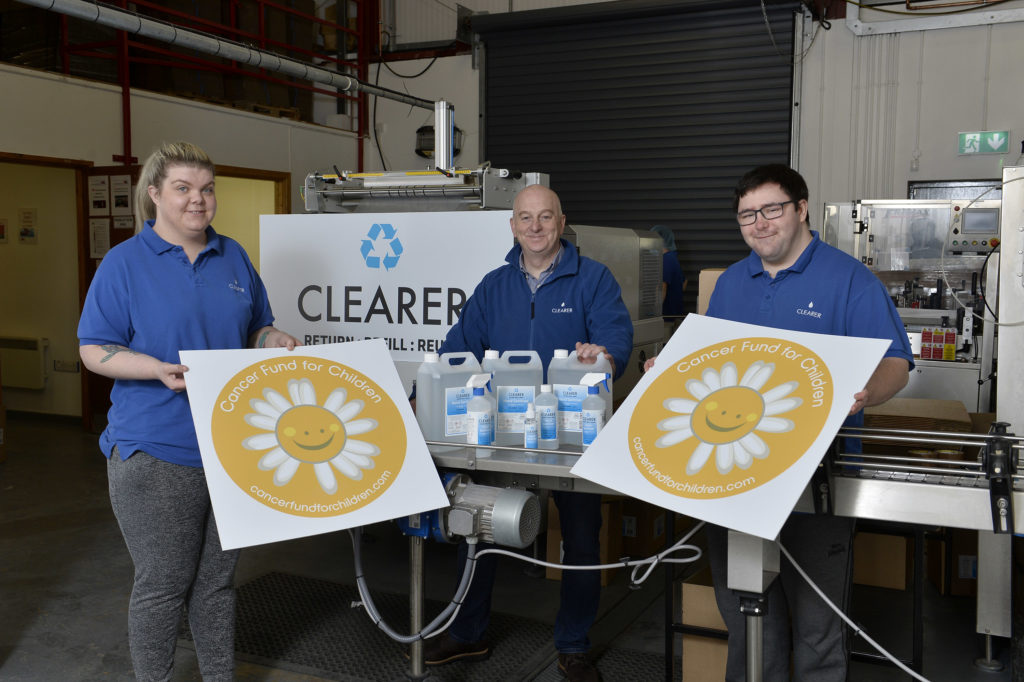
Clearer Hand Sanitiser remains true to the Clearer brand, providing a socially responsible product while supporting those most disadvantaged in our community. Hunter explains: “Clearer is committed to reducing plastic pollution, we encourage our customers to return their five-litre containers with their next delivery to be refilled and reused. Every return will result in a £1 donation to Cancer Fund for Children on behalf of Clearer Hand Sanitiser.
“In society there is a mixed understanding of what a social enterprise is. We are charities but the vast majority of our income comes from our business activities. It is how we use our profits to generate social value that differentiates us from the private sector. In this instance we had recognised another charity in the Cancer Fund for Children who were almost entirely relying on fund giving and whose services had been hit hard by the pandemic. Clearer Hand Sanitiser is a good demonstration of a social enterprise business with a social, economic and environmental impact.”
Hunter hopes that the perseverance of the business and efforts to increase awareness of the role of social enterprises will pay off. As well promoting the product to numerous organisations, Clearer recently received an order for its water from England, a sign that preparation for the re-opening of the economy is under way.
Speaking about how social enterprises can be given a more central role in the future economy, Hunter says: “Social enterprise and social value is a big part of build back better. How can organisations help to build back better? They can look at their supply chains and look for opportunities to direct their investment to local and social businesses.
“In using a social enterprise, the impact of your purchase becomes so much more and you’re adding value to that purchase. The great thing is, you don’t have to do anything extra to generate that social value other than make the conscious decision to look for businesses like ours and include them in your supply chains.”
Asked whether frustration surrounds the delay in the Executive progressing a Social Value Act for Northern Ireland which would place a legal requirement on the public sector to include social value in procurement decisions Hunter says: “I’m interested in the actions occurring and what I have seen and been a part of, with the Department of Finance, is the introduction of this through administration. We are moving towards a point where policy makers decide to administer for social value, including social value in the commissioning, before it gets to procurement and measuring that. As well as seeing, for the first time, weighting for social value in government procurement contracts. That will change the landscape.”
Looking to the future, Hunter says that while change in any business is inevitable, the forced nature of change brought about by the pandemic is unprecedented and must be seen as an opportunity for lessons to be learnt around supporting local production and supply.
He adds: “I’m also really keen that AEL learns lessons and that we position ourselves to take advantage of the opportunities that are there in efforts to build back the economy better, which I believe we’re already doing.
“Cross-sector collaboration, with the private sector backing projects like ours and government tenders which think about social value and social impact will help the economy not just survive but thrive in the future.”

